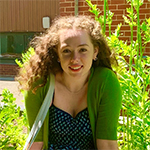In 2010, the Affordable Care Act sparked a nationwide debate on the extent of responsibility the American government has over our healthcare. But Dr. Laura Richman has been asking that question since long before that.
Richman is a health psychologist. “I examine psychosocial factors that have an impact on health behaviors and health outcomes,” she explains, sitting across from me at the Law School café. (Neither of us were wearing a cardigan. It was rather hot outside).

Richman is an associate professor at Duke in the Population Health Sciences, an associate of the Duke Initiative for Science & Society, and, coincidentally, my professor in the Science & the Public FOCUS cluster. She co-teaches the course Science, Law, and Policy with Dr. Yousef Zafar, in which we examine the social determinants of health through the lens of cancer screening, diagnosis, and treatment.
After graduating from the University of Virginia in 1997 with a Ph.D. in social psychology, Richman worked at a sort of think-tank for health professionals collaborating on social issues. This inspired her to pursue health research through the lens of social determinants.
“There was a lot of work on substance use, on mental health, on behavioral disorders. That certainly contributed to my continued interest in factors that have an influence on these [health] outcomes,” she said.
Continuing in this work, she became a research associate at the School of Public Health at Harvard University; Richman described her time at Harvard as “exciting,” which is not a word used by many to describe empirical research environments. “Certainly there’s that really robust relationship between low income, low education, low job status and poor health outcomes, but a lot of those pathways— like the ones we talk about in class, Olivia— had not been studied.”
She’s referring to the public health concept of ‘upstream’ and ‘downstream’ solutions. (The river parable goes as follows: when you observe a trend in people drowning in a certain river, you are presented with different ways of solving the problem. You can start pulling people out of the river and saving them one at a time, which is called a “downstream” solution in public health. You can also prevent people from falling into the river, which is called an “upstream” solution.)

Richman’s professional research explores another crucial social determinant of health we discussed in class: perceived versus actual discrimination. She asked whether marginalization — objectively or subjectively — can affect functioning, “both psychologically and cognitively. Like, how does it affect their thought processes? Their decision-making? Then, how does that affect their health?” You can read her study here.
One thing I noted immediately was Richman’s affinity for creative research design. In a lab she headed at Duke, she conducted one experiment with a student that tested the aforementioned effect of marginalization on health decisions. They provided subjects with a choice between unhealthy and healthy snack options after watching a video of, reading a passage about, or imagining members of their community experience discrimination.
In one study we read for Science, Law, and Policy, the stress effect of discrimination towards Arabic-named individuals after 9/11 was measured through the birth outcomes of Arabic-named mothers pregnant during that time. When I asked her about this, she said, “Particularly working with students, I think that they just bring so much energy and creativity to the research. Surveys serve their purpose — I think they’re really important, but I think there are just lots of opportunities to do more with research designs and research questions. I like trying to approach things from a different angle.”
Richman is also working on a book. She is studying relational health — health as determined by the opioid epidemic, the obesity crisis, and social isolation associated with aging. She hopes her project will be used in classrooms (and by the interested layman), and that the value of social determinants of health is reflected in increased funding dollars, more people interested in health disparities, more focus in medical education on the screening and referral system, and stimulating dialogue among people in positions of power on a policy level.

Post by Olivia Ares, Class of 2025
